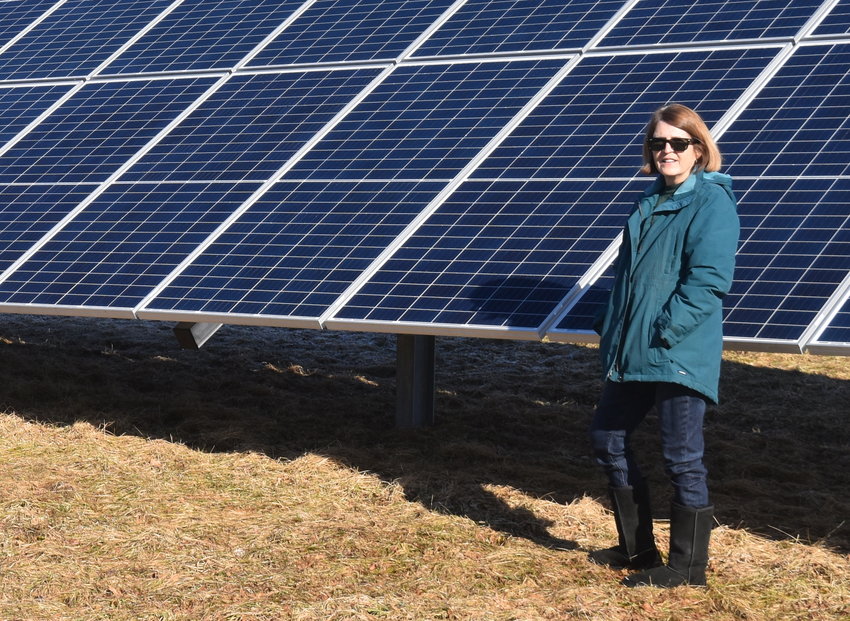
Denise Mahoney beside her solar panel that's generated nearly 2 million kilowatts of power in three months.
Edward Mahoney arrived home from a Hawaiian vacation this winter to a surprise in his mailbox: An annual property tax bill that had jumped $977, or 16 percent, over last year.
Like a growing number of people in mid-Michigan and across the state, Mahoney had recently installed solar panels on his property in rural Williamstown Township. Of the tax increase, $833 was due to solar.
While Mahoney and his wife did it for “altruistic” purposes to fight back against the anti-environment, anti-climate change “shit ass Trump guy,” it’s increasingly economical for property owners to install solar and reduce their electric bills. Upfront investments can pay off within a decade while panels have a 25-year lifespan.
In Michigan, however, this trend is up against two barriers: Utility opposition and tax treatment.
Most utilities say customers are paid too much for the power they send back to grid from solar panels, which helps reduce the investment payback period. (This claim is fiercely disputed by environmental groups at the Michigan Public Service Commission right now.)
The tax treatment of residential solar panels is another story.
Since 2013, the Michigan Tax Tribunal and the State Tax Commission have issued varying opinions on whether solar panels should count as something like a new underground pool or a remodeled kitchen — features that presumably increase the value of a property.
Last year, the state started treating residential solar panels as real property.
The change can increase annual tax bills by hundreds of dollars, again adding to the payback period and removing incentives to install clean energy.
“We sized the system not knowing and not expecting this new assessment,” Mahoney said. “If anyone is doing this for some kind of economic rationale, this will essentially cancel it out.”
Hands are tied?
Local assessors say their hands are tied, but apparently in varying degrees. Mahoney’s tax bill jumped more than $800 based on the Williamstown Township assessor’s calculation. Mahoney, a professor emeritus in Michigan State University’s Department of Sustainability, has a 10-kilowatt, 32-panel system, which can produce more power than he uses. It cost him $35,000.
David Lee, the assessor for East Lansing and Meridian Township, disagrees that solar panels add that much value to a property, if at all.
“I don’t think there’s a lot of value added from these installations in this market,” Lee said.
Prior to the state’s 2018 guidelines, Lee did not assess solar panels. Now he values them with high depreciation rates since they degrade over time and because buyers in the area “aren’t super interested” in them. Also, there’s hardly any basis for comparison, since it would be rare for a homeowner who installed panels to sell the house. Lee said fewer than 50 properties between East Lansing and Meridian Township have solar panels.
For an average residential installation in Meridian Township — or about half the size of Mahoney’s installation — Lee calculated it would increase the annual tax bill about $150. Doubling the size would still be less than half of Mahoney’s tax increase.
Williamstown Township Supervisor Wanda Bloomquist said Mahoney’s assessment was calculated based on “very clear guidelines” from the state.
“I understand (Mahoney’s) concerns, but this is what the state has handed down, and that’s what we need to follow,” she said.
But Lee said views differ among assessors: “They’re going to try and measure the market value increase — there’s a lot of judgement that comes into play.”
Even for solar installers, the assessment isn’t clear.
“I don’t know where the education for the assessing comes from,” said Christian Munz, an area salesman for Jackson-based Harvest Energy Solutions, which installed Mahoney’s project. “I understand the state has a job, but if you don’t fully understand the full value of solar, it might be hard to tax it.”
While solar costs are declining, relatively few utility customers have installed it. According to the MPSC, between 130 and 300 utility customers are enrolled in solar programs in the five-county area of Livingston, Shiawassee, Clinton, Ingham and Eaton. The Lansing Board of Water & Light (not regulated by the MPSC) has 31 customers enrolled in its solar “net metering” program.
Until February 2018, Michigan municipalities acted individually on whether to tax the value of solar panels, creating a myriad patchwork of uncertainty. Then former Gov. Rick Snyder’s Treasury Department stepped in, forcing municipalities to treat panels as real property.
Acknowledging this patchwork of tax treatment, Democrats and Republicans rallied around a common solution: Reinstate the pre-2013 tax exemption to provide certainty and incentivize selfowned, renewable energy.
Rally they did. In December, the state Senate unanimously passed the tax exemption bill. It passed the House 106- 3. The legislation had support from the Michigan Chamber of Commerce and the Michigan Environmental Council.
Snyder, however, raised “technical concerns” over the different tax treatment of those who installed panels before the bill took effect. Snyder vetoed the bill in his last days in office, shortly after Mahoney installed his solar panels.
State Sen. Tom Barrett, R-Potterville, reintroduced the bill in January. Advocates are hopeful the new administration will resolve the issue and encourage solar projects.
“With Gretchen Whitmer in there,” Munz said, “we’re hoping solar arrays will be exempt.”
Support City Pulse - Donate Today!
Comments
No comments on this item Please log in to comment by clicking here